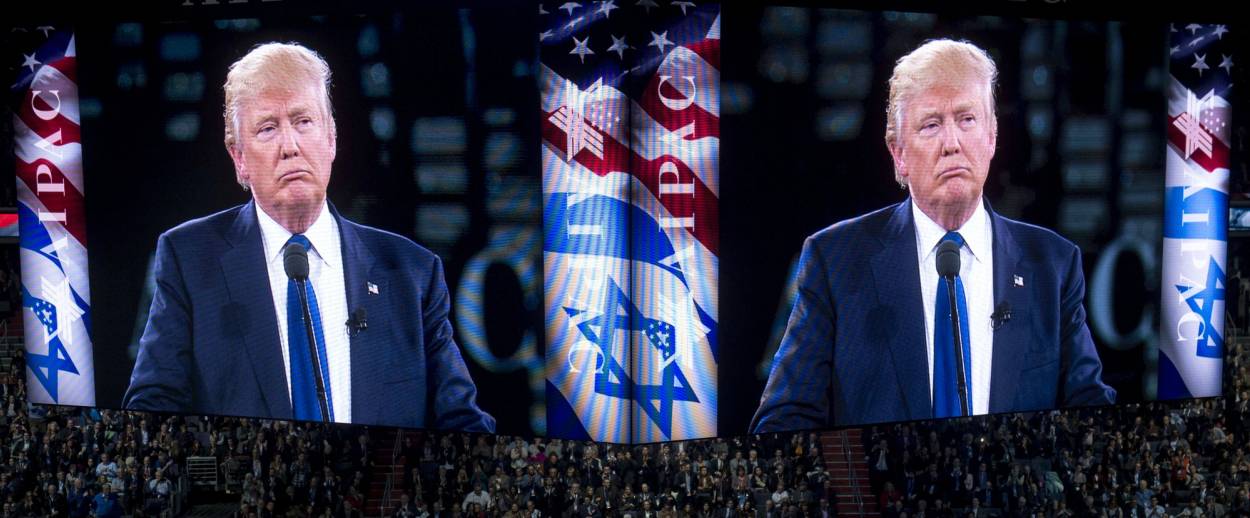Trump’s Israel Ground Game Takes Effect
Donald Trump’s Israel pivot has begun, gliding from a position of ‘neutrality’ on the Israeli-Palestinian conflict to one that is decidedly pro-Israel




It’s hard to imagine someone winning a U.S. presidential election with high, unfavorable ratings across nearly every demographic category—meaning that Donald Trump will need to distance himself from a number of statements and positions over the course of the next six months if he wants to make it to the White House. As it happens, the businessman is already in the process of walking back a position for which he was briefly pilloried by his now-dispatched Republican primary opponents: the oft-repeated promise that he would take a “neutral” approach to the Israeli-Palestinian conflict, whatever that meant.
But the Trump Israel pivot has begun. There’s already a groundswell of evidence that the presumptive Republican candidate is repositioning himself, carving out a position that’s more palatable to the mass of Republican voters—albeit with a few Trumpian flourishes. Like his foreign policy speech on April 27, Trump’s recent Israel messaging is an early sign of how, and whether, a substantive political operation can coexist with Trump’s trademark bombast, provocation, and sheer unpredictability. This could be a preview of other pivots to come.
The most important aspect of Trump’s Israel pivot may have already taken place outside the public’s view. On May 6, the casino magnate, Jewish philanthropist, and prolific Republican political donor Sheldon Adelson announced that he was supporting Trump, and declared that the deal estate mogul would be “good for Israel.” Adelson, who is the owner of the right-leaning Israeli newspaper Israel Hayom and a skeptic of the two-state paradigm for resolving the Israeli-Palestinian conflict, essentially sat out a Republican primary season that included the outspokenly pro-Israel senators Ted Cruz and Marco Rubio. It’s unlikely Adelson would throw his support behind someone who couldn’t convince him of his pro-Israel bona fides. Adelson’s support is important enough to make Trump’s “neutrality” position seem like primary-season minutia—especially since the real estate mogul has already admitted that he’s incapable of self-financing a general election campaign.

The swing in Trump’s Israel messaging has partly to do with the identity of one of his messengers. On May 4, Algemeiner published an interview with Jason Greenblatt, a real estate lawyer for the Trump organization who is reportedly one of the presidential candidate’s closest advisers on Israel-related matters. Greenblatt downplayed the impact of Israeli settlement expansion in the West Bank on a final Israeli-Palestinian peace settlement, and assured readers that Trump would not follow Hillary Clinton’s example of berating Israeli Prime Minister Benjamin Netanyahu over construction in East Jerusalem, as the then-Secretary of State reportedly did in 2010. Greenblatt had been the subject of a JTA profile in mid-April as well. Trump’s campaign is building up a Jewish communal surrogate in order to engage in targeted messaging around an issue on which the candidate might be perceived as vulnerable or problematic. This is exactly the kind of thing one would expect out of a serious political operation in the run-up to a general election.
The message itself is more recognizably Trumpian. On May 3, Trump told the Daily Mail that Israel should keep “moving forward” on settlement construction in the West Bank as a response to Palestinian rocket attacks. Support for settlement expansion is a far cry from the U.S. “neutrality” in the Israeli-Palestinian conflict which Trump repeatedly advocated during the primary season. But like his “neutrality” claims, Trump’s statement on settlements has an ad-hoc quality to it, and appears to be disconnected from any concrete policy or plan.
“Neutrality” was Trump’s way of conveying the idea that only his transcendent dealmaking abilities were capable of resolving one of the famously intractable conflicts in history. Backing settlement construction—something that both Hillary Clinton and president Barack Obama oppose, and a position that runs contrary to decades of bipartisan policy towards Israeli-Palestinian affairs—is a similarly awkward attempt at signaling his distance from conventional foreign policy thinking, albeit in the opposite direction.
Substance aside, Trump’s settlement position betrays a subtle acknowledgement of general election realities. A recent Pew poll revealed a fairly wide gap in support for Israel between Trump and Clinton supporters, with 77 percent of the presumptive Republican nominee’s backers, and 75 percent of Republicans, sympathizing with Israel over the Palestinians in the Israeli-Palestinian conflict, compared to 47 percent of Clinton’s supporters. Israel represents a potential area of contrast with Clinton, at least at the level of Democratic and Republican voter priorities. And it represents a policy area in which Trump has strayed from what the vast majority of his constituency seems to actually support. It makes perfect political sense then, for Trump to begin to ease into a more recognizably Republican position on Israel, given his voters’ views and the nearly 30-point gap in pro-Israel sympathies with the opposition.
Could Trump’s Israel pivot become the template for future shifts in position? Israel is a fairly easy box for the real estate mogul to check: Unlike immigration or trade, the Middle East peace process hasn’t been at the center of Trump’s pitch to American voters. And support for Israel is still a majority position among American voters, despite the Pew poll’s apparent partisan gap. Yet Trump’s recent activity around Israel is one of the few examples of him using surrogates, communal validators, pre-written speeches, and headline-worthy pronouncements to reorient his position on an issue that had been the cause of earlier controversy. With most voters rejecting Trump’s current message, it’s a toolkit he might have to get used to using if he wants to come anywhere close to winning the White House.
Related: Trump Watch [Tablet series]
Armin Rosen is a staff writer for Tablet Magazine.